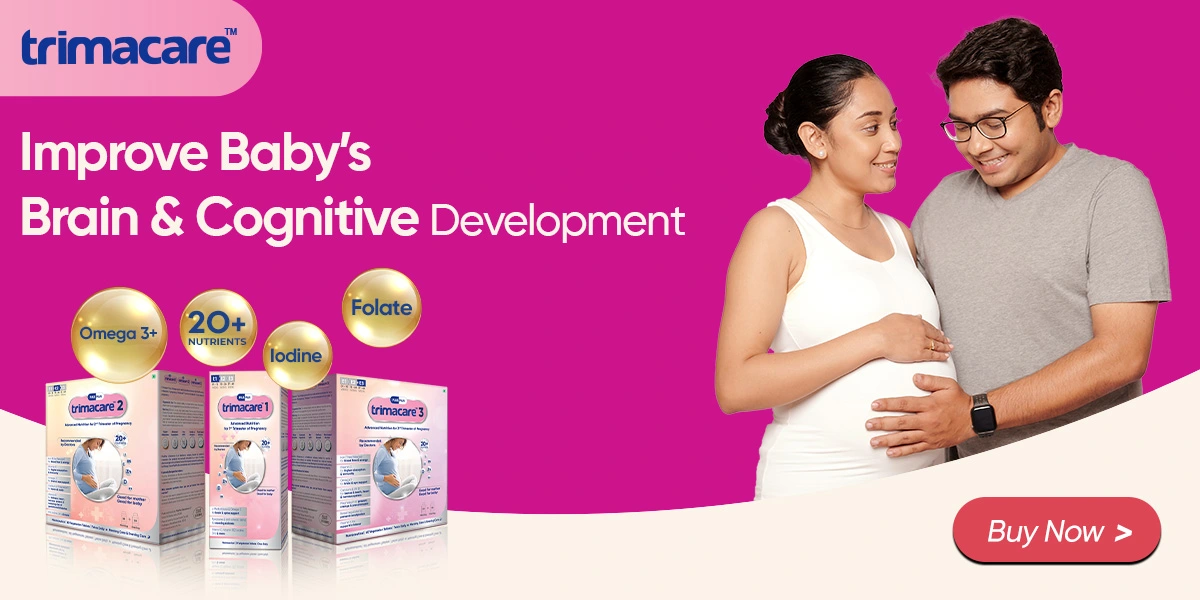Nutritious diet plays a vital role in promoting the healthy growth of both mother and child during pregnancy. Among the many nutrients required, omega-3 fatty acids, specifically docosahexaenoic acid (DHA), are essential for optimal brain development in the foetus. Omega-3 fatty acids, particularly DHA, are essential for the development and function of the brain and neurological system. DHA is a key component of brain cell membranes and is essential for neural growth, synapse formation, and cognitive function. As the foetus grows fast throughout pregnancy, the demand for omega-3 fatty acids rises. According to some studies, omega-3 fatty acids also reduce depressive symptoms in perinatally depressed women.
Benefits of Omega 3 in Pregnancy
Benefits of Omega 3 in pregnancy are countless for pregnant women. Some of the benefits are –
- Promotes Healthy Pregnancy: Omega-3 fatty acids helps in reducing inflammation in the body, supporting immune function, and maintaining cardiovascular health during pregnancy.
- Foetal Development: Omega-3s, especially DHA, are essential for developing baby’s brain, nervous system, and eyes. With an adequate intake of omega-3s, pregnant women can help support optimal foetal growth and development.
- Healthy weight of the baby: Consuming omega 3 fatty acids early in the twelfth week of pregnancy helps to ensure that the baby’s birth weight is not too low. Babies with low birth weight are more susceptible to several diseases.
- Increased production of breastmilk: Breast milk is essential for newborn babies to develop immunity and keep illnesses at bay. Omega-3 fatty acid supplements help to enhance to enhance the breastmilk.
- Reduces the risk of premature birth: Women who consume more omega-3 fatty acids, eicosapentaenoic acid (EPA) and DHA, may have a lower risk of premature birth.
Role of Omega 3 in development of the Baby’s Brain
Omega-3 fatty acids play a crucial role in the development of a child’s brain during pregnancy. Here are some key reasons why omega-3 is important for the development of child’s brain:
- Brain Structure and Function: Omega-3 fatty acids, particularly docosahexaenoic acid (DHA), are major components of the brain tissue. DHA is essential for the growth and maturation of the foetal brain, contributing to the formation of brain cells, neural connections, and overall brain structure. Adequate intake of DHA during pregnancy supports optimal brain development.
- Cognitive Development: Omega-3 fatty acids are associated with improved cognitive function in children. DHA supports the development of memory, attention, problem-solving skills, and overall cognitive abilities. Maternal intake of omega-3s during pregnancy has been linked to better academic performance and cognitive outcomes in children.
- Visual Development: DHA is also crucial for the developing child’s visual system. It is a vital component of the retina, the light-sensitive part of the eye. Sufficient omega-3 intake during pregnancy supports the development of the baby’s visual acuity, which is important for their visual perception and learning.
- Neurological Development: Omega-3 fatty acids have been associated with a reduced risk of certain neurological disorders. Higher levels of DHA during pregnancy have been linked to a lower risk of developmental disorders, such as autism spectrum disorder and attention deficit hyperactivity disorder (ADHD).
- Neuroprotective Effects: Omega-3 fatty acids have neuroprotective properties, meaning they help protect the brain cells from damage and promote their survival. Omega 3 is important during the period of foetal brain development, where omega-3s can provide a supportive environment for the growing brain.
Trimacare prenatal vitamins – Best Omega 3 supplement for Vegetarian pregnant women
Trimacare prenatal tablets are 100 percent vegetarian. The perfect ratio of 2:3 for omega-3 (EPA: DHA) is present, which is best for pregnancy needs. The Omega supplement from Trimacare has no harmful side effects, burps, or fishy odours. Trimacare is therefore perfect for vegetarians or women who are sensitive to omega 3, fatty acids, docosahexaenoic acid (DHA), or fish oil present in prenatal supplements.
Omega-3 plays a vital role in the development of a child’s brain during pregnancy. The presence of docosahexaenoic acid (DHA) in omega-3 is significant for the growth and maturation of the foetal brain, contributing to brain structure, neural connections, and cognitive function. Omega-3 intake during pregnancy also supports optimal brain development, memory, attention, problem-solving skills, and visual activity.
Frequently Asked Questions:
1. Why is Omega 3 important for baby’s brain development during pregnancy?
During pregnancy, omega-3 fatty acids, particularly DHA (docosahexaenoic acid), play a crucial role in the brain development of the baby. DHA is an important structural component of the brain and retina, and getting enough of it during pregnancy helps the fetus develop their brains and eyes to their full potential.
2. How can I ensure I’m getting enough Omega 3 during pregnancy?
By eating foods high in Omega 3 fatty acids, you can make sure you get enough Omega 3 during pregnancy. Flaxseeds, chia seeds, and walnuts are good sources, as are fatty fish like salmon, mackerel, and sardines. Alternately, you can take Omega 3 supplements, but you should talk to your doctor before starting any new supplements while you’re pregnant.
3. Can Omega 3 supplements be harmful during pregnancy?
When taken in the recommended amounts, omega 3 supplements are generally safe for most pregnant women. However, taking high doses of some Omega 3 supplements can increase the risk of bleeding too much, so it’s important to talk to your doctor before taking any supplements while you’re pregnant.
4. Are there any benefits of Omega 3 for the mother during pregnancy?
Yes, pregnant women can reap a number of benefits from omega-3 fatty acids. They can support the health of the mother as a whole and reduce the risk of preterm birth and preeclampsia.
5. When should I start incorporating Omega 3 into my pregnancy diet?
It’s prescribed to begin integrating Omega 3 into your pregnancy diet as soon as could be expected, preferably even before origination if conceivable. During crucial phases of the development of the fetal brain, this enables optimal levels of DHA to be available. It is never too late to begin consuming Omega-3-rich foods and supplements during pregnancy if you haven’t already.
A Certified Nutritionist with a rich healthcare background in health journalism, the author has immense experience in curating reader-friendly, engaging, and informative healthcare blogs to empower readers to make informed pregnancy-related decisions.













